Tabletop role-playing games (RPGs) have the power to transport players into fantastical worlds and allow them to become heroes, villains, or anything in between. While the genre has traditionally been associated with a narrow scope of representation, a new wave of RPGs has emerged that prioritise diversity, inclusivity, and authentic storytelling. In this post, let’s explore RPGs that go beyond the traditional boundaries, including:
- Bluebeard’s Bride
- Monsterhearts
- Ehdrigohr
- Ironsworn
- Good Society
These games shine a light on different aspects of diversity, representing feminine horror, LGBT+ themes, and incorporating Indigenous cultures and mythologies. Let’s dive into the inclusive adventures awaiting us!
Bluebeard’s Bride
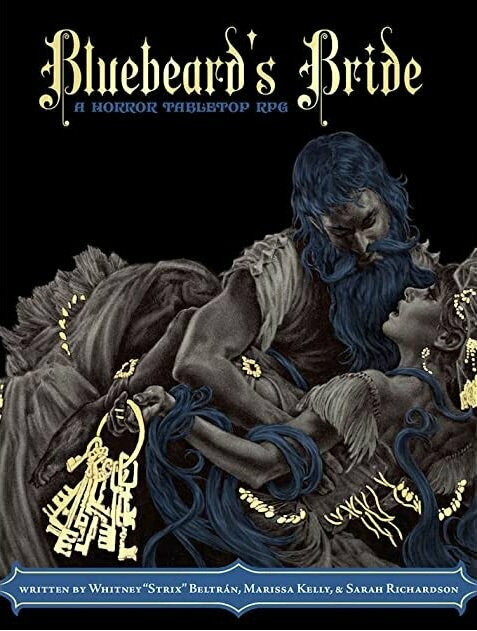
Bluebeard’s Bride is a haunting and evocative RPG that reimagines the classic fairy tale through a feminist lens. In this game, players collaboratively assume the roles of different aspects of a bride exploring her new husband’s mansion. The game explores themes of feminine horror, power dynamics, and the unraveling of the bride’s psyche. Bluebeard’s Bride challenges traditional notions of storytelling by placing the players in the shoes of a female protagonist (indeed, the same female protagonist) and exploring the complexities of womanhood through a dark and atmospheric narrative.
Monsterhearts
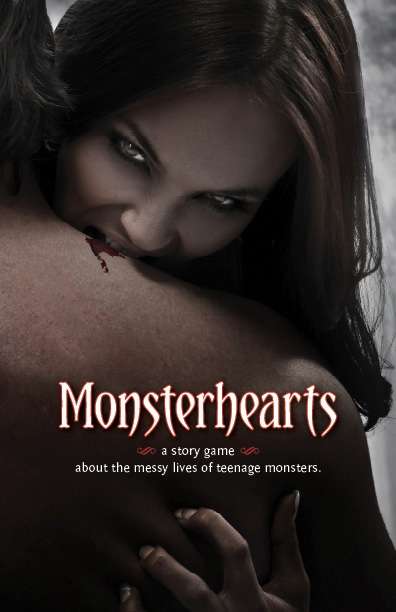
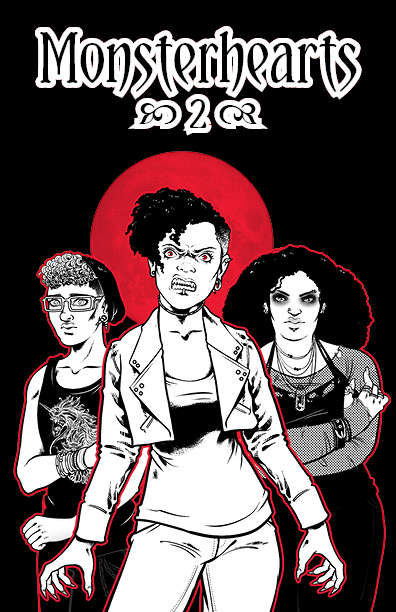
Monsterhearts is a PbtA-based RPG that takes the struggles of adolescence and intertwines them with supernatural elements. Inspired by shows like Buffy the Vampire Slayer, this game focuses on the lives of teenage monsters navigating love, identity, and the complexities of being a marginalised individual. With its LGBT+ themes, Monsterhearts offers a safe and inclusive space for players to explore diverse relationships, delve into personal struggles, and examine the intersection of identity and monstrosity.
Being a PbtA game, Monsterhearts also has a solid system under the hood, and is pretty accessible. Character sheets take the form of class ‘workbooks’ that keep everything a player needs in one short document.
Ehdrigohr
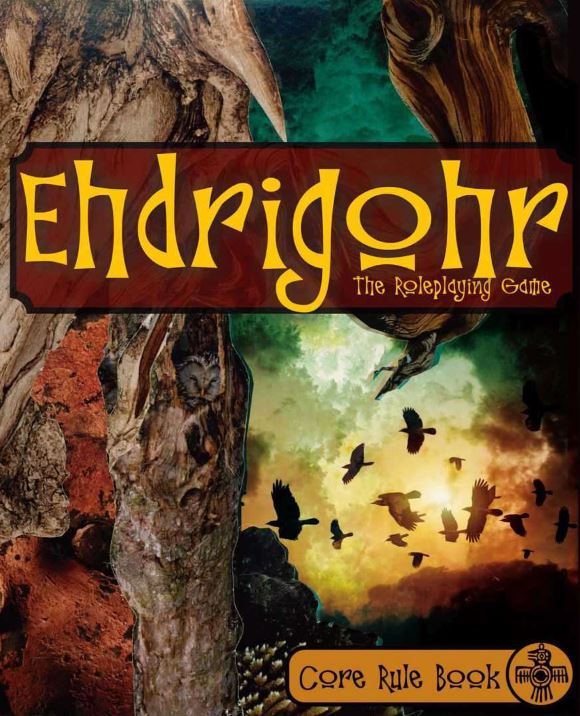
Ehdrigohr is an RPG that weaves together Indigenous cultures and mythologies, creating a rich and vibrant world deeply rooted in Indigenous storytelling traditions. Here’s a video outlining the game:
Set in a post-apocalyptic landscape, the game immerses players in a world where ancient spirits, mystical powers, and cultural heritage intertwine. Ehdrigohr emphasizes the importance of community, cooperation, and the preservation of ancestral knowledge. By incorporating Indigenous cultures, this game provides a platform for representation and highlights the value of diverse narratives within the realm of RPGs.
Ironsworn
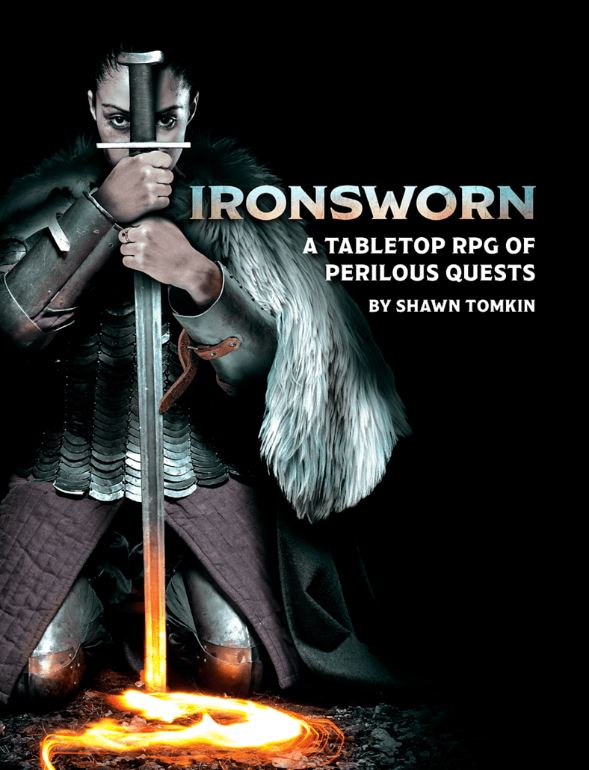
Ironsworn is a fantasy RPG that offers a flexible and inclusive experience for players. One notable aspect of Ironsworn is its commitment to inclusivity through the use of inclusive language and explicit statements of commitment throughout the book. That said, a common criticism of games that push themselves as being ‘inclusive’ is that it can sometimes be done at the expense of immersion or story. That is not the case for Ironsworn. I feel that these issues are handly matter-of-factly and are presented as something almost taken for granted. here are three snippets that I took from my copy of the book:

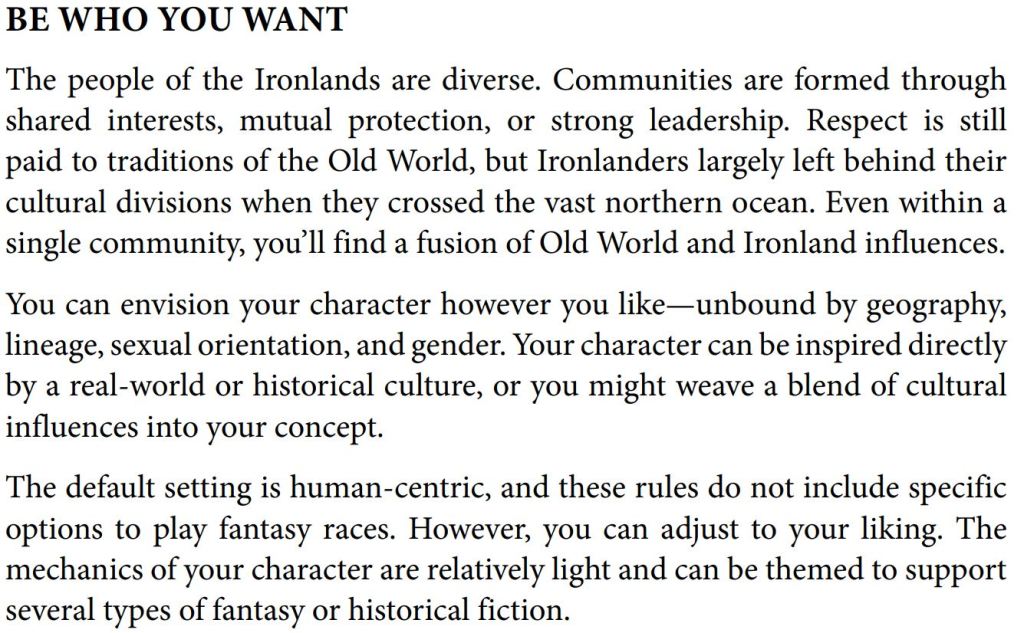

See what I mean? Not overbearing, but just taking inclusivity as a settled fact, rather than as something to be pushed or argued. ‘Normalising good practice’ is what we’d call this at work.
Mechanically, the game is based on the FATE system. I love this system (especially the implementation used for the Dresden Files RPG) and it’s suitably flexible to give players and GMs a lot of options for their stories. This is ideal for Ironsworn’s goal of allowing players to embark on epic quests in a world of peril and mystery, emphasising player agency and storytelling. Ironsworn’s focus on collaboration, personal goals, and immersive world-building creates a space where diverse voices can be heard and celebrated; as should be common in roleplaying games.
Good Society
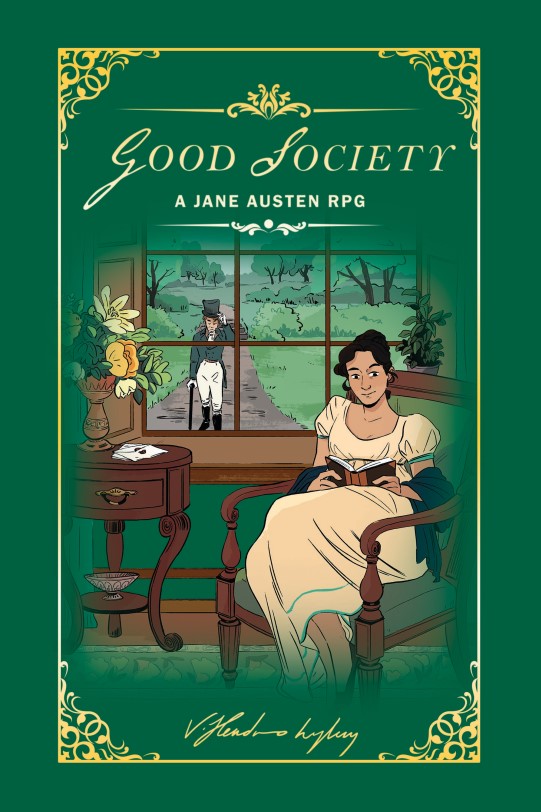
Good Society is an RPG that transports players to the Regency era, immersing them in a world of Jane Austen-like social dramas. This game offers opportunities for players to explore different backgrounds, social statuses, and identities in the period. Good Society embraces themes of love, scandal, and societal expectations, highlighting the nuances of interpersonal relationships and the challenges thereof.
It also acknowledges, as it should, the time period, particularly in relation to gender:
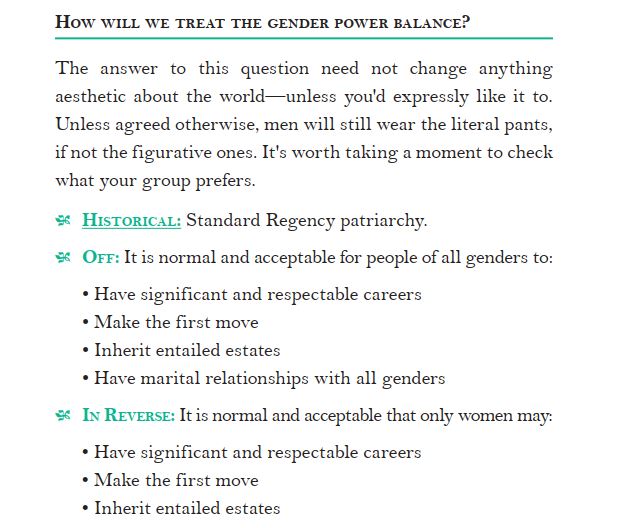
I do appreciate that this is considered by the writers, but also left to the discretion of individual groups. I’ve written before about the importance of establishing the boundaries that are required by your individual group. Even sticking to the historic gender dynamic, there’s a lot of opportunity here to explore the issue, whether that is played straight or subverted.
What’s not addressed is the issue of race in the regency. Here’s what the writers say on that topic:
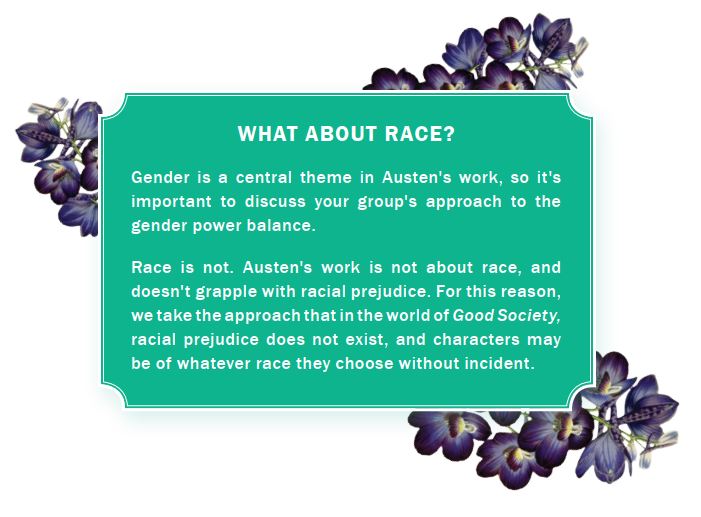
I understand their stance on this. This is a game with a really specific focus; the work of Jane Austen. I imagine there are some who might see this as a cop out or a missed opportunity, but not every game needs to be everything to everyone, I suppose.
By showcasing diverse experiences within a period setting, Good Society expands the boundaries of representation in RPGs.
Check it out at Storybrewer’s Roleplaying.
RPGs are evolving. A new generation of games is prioritizing diversity, representation, and authentic storytelling. The games listed today are just a few examples of RPGs that challenge traditional norms and embrace inclusivity. These games offer exciting and inclusive adventures that go beyond the limitations of traditional RPGs, showcasing diverse experiences, exploring marginalized perspectives, and celebrating the power of representation. By prioritizing diversity and representation, these RPGs create spaces where players from all backgrounds can see themselves reflected in the narratives and characters they embody. They pave the way for a more inclusive and welcoming tabletop gaming community, fostering empathy, understanding, and a deeper appreciation for the diverse tapestry of human experiences.
As players, we have the opportunity to embrace these inclusive RPGs, supporting their creators and championing diverse voices in the gaming industry. By exploring games like those listed above, we not only embark on thrilling adventures but also contribute to the ongoing movement for greater diversity and representation in tabletop gaming.


I really enjoyed running Bluebeard’s Bride as a change of pace from my groups regular long form campaigns. It really got under my skin in a way that most RPGs haven’t since the first time I played call of Cthulhu. I don’t think it works foe anything other than one shots, but I like the idea of running it as an annual Halloween holiday game.
LikeLike